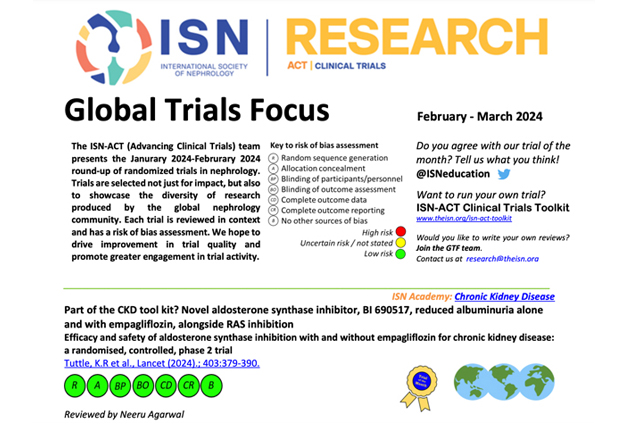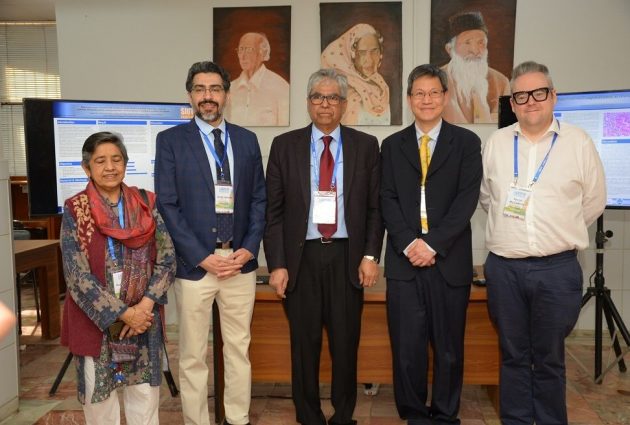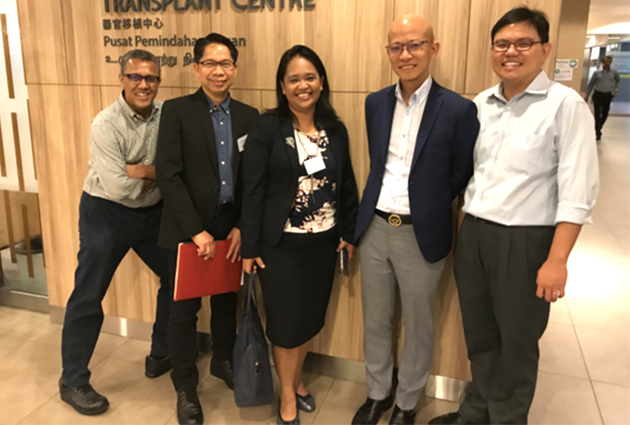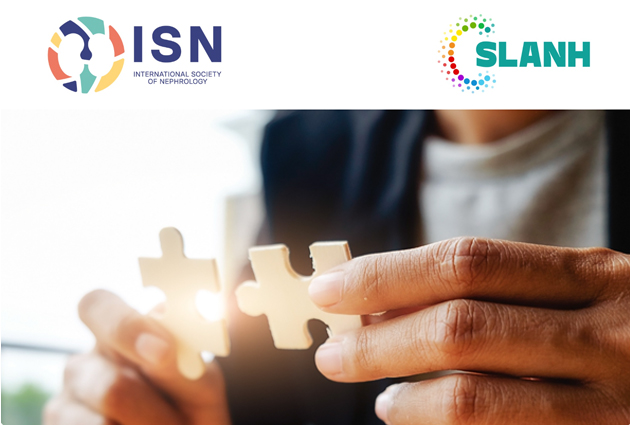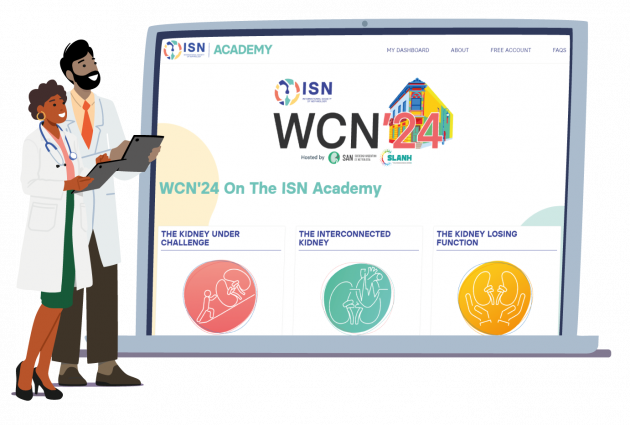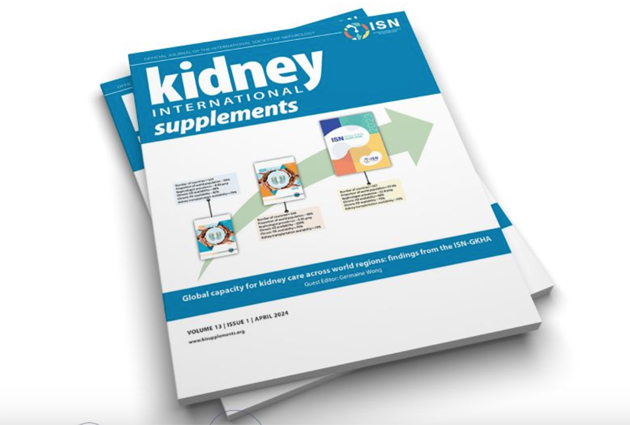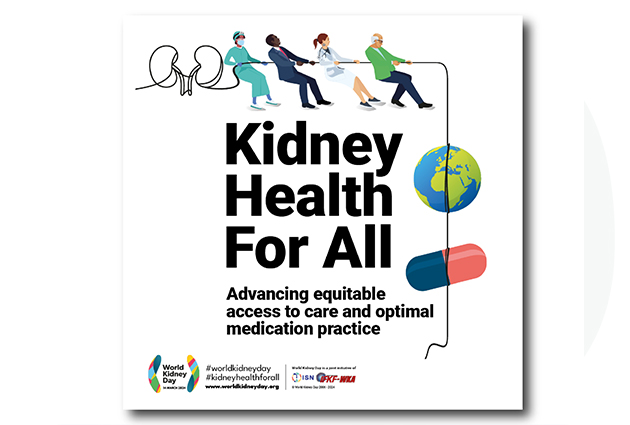ISN Advocacy Newsletter – Bridging the Gaps – March 2022
Bridging the Gaps: Policy Forum to Kidney Emoji – Discover the Latest ISN Advocacy Initiatives to Help Reduce Kidney Diseases & Improve Kidney Care
 Welcome members and allies to Bridging the Gaps, the ISN’s quarterly update on how we are advocating and collaborating with patients and partners to address the global burden of kidney disease.
Welcome members and allies to Bridging the Gaps, the ISN’s quarterly update on how we are advocating and collaborating with patients and partners to address the global burden of kidney disease.
As a global society representing kidney care professionals from 163 countries throughout our ten regional boards, and with current tragic events in Ukraine and challenges in other parts of the world in mind, the ISN remains available to facilitate communication and advocate for the health and safety of all healthcare professionals, and their patients.
In last few months, ISN hosted the annual Professor Donal O’Donoghue Global Kidney Policy Forum was held at the 2022 World Conference of Nephrology (WCN) in Kuala Lumpur, Malaysia, and virtually; and, with IFKF, the annual World Kidney Day campaign culminated on March 10.
ISN’s newly constituted Patient Liaison Advisory Group was launched at WCN’22 and is already playing a role in integrating kidney patient perspectives into the development of our advocacy efforts to develop policy responses to global challenges like the aftermath of the COVID-19 pandemic.
While we are thankful that the pandemic is abating, we cannot forget the sacrifices made by our professional colleagues in tackling it over the last two years, nor the disproportionate impact that it is having on the health of kidney patients the world over.
Accordingly, we were glad to have participated in the recent special session of the World Health Assembly and call for prioritizing kidney health within the proposed WHO Treaty on pandemic preparedness and response.
This will be challenging as, despite there being over 850 million people worldwide living with some form of kidney disease, it is still the “silent killer” and therefore does not currently dominate political or public discourse.
Nevertheless, I am confident that with your continued help, we can jointly deliver a future where everybody has equitable access to sustainable kidney health.
ISN’s Advocacy Director, Paul Laffin, is available to discuss how best we can do this; please do reach out to him.

Agnes Fogo
ISN President
The ISN, as a board member of the European Kidney Health Alliance (EKHA), worked to secure a historic debate on chronic kidney disease (CKD) at the European Parliament (EP) Plenary session on March 10, 2022.
Stella Kyriakides, Commissioner for Health and Food Safety, addressed Members of the EP (MEPs), stressing the importance of kidney health. She outlined incidences of CKD currently affecting about one in ten Europeans, with the burden expected to grow as diabetes and hypertension, the two leading causes of kidney disease, become more prevalent in Europe. She added that the COVID-19 pandemic had a heavy toll on patients with CKD, having a higher risk of suffering severe adverse outcomes if infected.
Ms. Kyriakides informed parliament that the European Commission is implementing effective programs to prevent kidney disease by tackling its root causes. These include the EU initiatives “Healthier Together,” “Europe’s Beating Cancer Plan,” and “EU4Health,” as well as programs such as “Horizon Europe” (2020 and 2021), which directly addresses kidney disease management, technology and devices, and boosting research in the field.
All the MEPs concurred that CKD is an important issue affecting millions of Europeans and stressed the need for the EU to focus on prevention and early diagnosis.
The ISN will build on this new momentum to create increased awareness of kidney diseases alongside MEPs and work toward obtaining concrete policy outcomes from the European Commission.
Watch a recording of the debate here.
The Professor Donal O’Donoghue, Global Kidney Policy Forum: Building Healthier Sustainable Communities to Safeguard Kidney Health, held virtually, brought together key decision-makers and stakeholders, including WHO representatives, local politicians, patients, and internationally renowned kidney care professionals at the World Congress of Nephrology 2022.
In line with the 12 Recommendations to Global Kidney Health, speakers addressed the burden of kidney diseases in the Southeast Asia region and discussed policies and strategies to improve kidney care and prevention at regional and global levels. Keynote speakers included:
- Dr. Ong Loke Meng, National Head of Nephrology Service for the Ministry of Health Malaysia
- Dr. Slim Slama, Unit Head, Noncommunicable Diseases Management-Screening, Diagnosis, and Treatment (MND), at the World Health Organization
- Mr. Manvir Victor, kidney patient, patient advocate, and inaugural chair of the ISN Patient Liaison Advisory Group
- Dr. Amrish Krishnan, a Fijian nephrologist who set up the first kidney hospital in Fiji
The ISN will be working with local partners toward applying the forum’s recommendations and helping address the significant variations in the accessibility, affordability, and quality of care throughout this region.
Watch the event here.
The ISN’s Patient Liaison Advisory Group was officially launched at the World Congress of Nephrology 2022.
Mr. Manvir Victor, inaugural chair of the group and a patient advocate from Malaysia, presented the group’s mission statement:
‘Created in 2021, the ISN’s Patient Liaison Advisory Group represents the inter-continental diversity of kidney patients with one representative from each of the society’s ten regions. Its mission is to advise and guide the ISN so that the patient perspective becomes embedded within our work, shaping health initiatives and research programs so that they tackle the global burden of kidney disease.’
After other group members had presented their kidney health experiences and hopes, Mr. Victor concluded by stating that “Healthcare needs help, and there are so many impassioned patients who are willing to join and assist. Together with my other patient advocacy compatriots locally and internationally, we will continue to knock.”
Watch the event here and read more on the launch and WCN’22 here.
The ISN launched its first Advocacy and Policy Course – New Skills for the Modern Nephrologist at WCN’22.
Watch the course content here.
The course covered the principles and practicalities of designing and conducting effective advocacy campaigns to equip participants with the knowledge, skills, and techniques to advocate successfully at all levels of policymaking.
Internationally renowned kidney health advocates introduced the concept of advocacy and provided real-life success stories from kidney care campaigns in different countries. The course emphasized the importance of aligning advocacy strategies with patient perspectives and the need to skilfully present data to policymakers.
On March 10, the ISN, together with the American Society of Nephrology (ASN) and the European Renal Association (ERA), released a joint statement, “Global Kidney Organizations Appeal for Kidney Health for All War Victims,” expressing our concern for the health and safety of all people, including those with kidney diseases, kidney failure, and kidney transplants in Ukraine and all war-torn countries.
The ISN issued an official statement offering its availability to facilitate communication and advocate for the health and safety of all healthcare professionals and their patients in Ukraine.
It is providing open access to the Seminars in Nephrology July 2020 issue on “Conflict Nephrology,” available on the Seminars in Nephrology website and ScienceDirect.
In addition, the ISN co-signed the European Kidney Patients’ Federation’s (EKHA) open letter alongside the EU commissioner for health and food safety. The ISN supported EKHA in developing and publishing “Wars and kidney patients: a statement by the European Kidney Health Alliance related to the Russian-Ukrainian conflict.”
The ISN submitted three statements supporting global kidney health, as a co- and sole-signatory, to the 150th session of the World Health Organization’s Executive Board, held in January.
Working alongside partners in the Global Coalition for Circulatory Health (GCCH), the ISN co-signed a statement on WHO’s work in health emergencies, calling on member states to prioritize ongoing prevention, screening, and treatment for circulatory conditions in national COVID-19 response and recovery plans.
The ISN signed a joint statement along with several global aid organizations; World Vision International, March of Dimes, Nutrition International, Save the Children, International Rescue Committee, Micronutrient Forum, Water Aid, and the Global Health Council. The statement on maternal, infant, and young child nutrition urges member states to promote chronic kidney disease screening and prevention to avoid the development of anemia.
The ISN was the sole signatory of “Draft recommendations on how to strengthen the design and implementation of policies, including those for resilient health systems and health services and infrastructure, to treat people living with noncommunicable diseases (NCDs) and to prevent and control their risk factors in humanitarian emergencies,” advising member states to:
- Integrate essential medication and diagnostics for kidney disease into existing NCD emergency plans
- Increase investment in such plans to ensure access to high-quality, essential services for people living with kidney disease in humanitarian emergencies
The ISN is currently inviting WHO Executive Board members and other key countries to discuss negotiating a global accord to help keep future generations of kidney patients safer from the impact of pandemics. This initiative follows ISN’s work with the GCCH on the above-mentioned joint statement and the publication, “Preventing the Next Pandemic: The Case for Investing in Circulatory Health – A Global Coalition for Circulatory Health Position Paper.” It also builds on the World Health Assembly’s historic decision to establish an intergovernmental negotiating body to draft and negotiate a WHO convention, agreement, or another international instrument, on pandemic prevention, preparedness, and response.
The ISN supports the Medical Emoji Campaign and petition for the creation and inclusion of a kidney emoji.
Emojis have become an integral part of modern communication. Medical emoji already exist for the brain, anatomical heart, lungs, and X-ray. However, emoji for crucial organs such as the kidney do not yet exist. A more consistent set of medically accurate emoji, including a kidney emoji, is important for patient communication, patient care, and for representing health in a modern and accessible way.
Please do share this campaign and petition within your networks and on social media. You can find social media resources here and like and re-share ISN’s tweet here.
The ISN encourages all to sign the petition calling for a kidney emoji here.
The link between kidney diseases and hypertension has been well documented, necessitating global awareness on blood pressure management and prevention. The World Hypertension League marked World Kidney Day enthusiastically alongside the ISN and advocates for kidney health on World Hypertension Day. These campaigns help raise awareness that strategies for hypertension control also improve renal function and reduce the risk of kidney diseases.
Recognizing that such education initiatives are most effective early in life, the World Hypertension League has launched the Children’s Art Program “Promoting Healthy Lifestyles.” The campaign focuses on blood pressure awareness and prevention of kidney, stroke, and cardiovascular diseases. Young artists can submit artworks illustrating the importance of a healthy lifestyle that will be exhibited on World Hypertension Day on May 17, 2022.
World Kidney Day (WKD) took place on March 10.
Public and media attention for the WKD 2022 campaign attained notable reach:
- WKD content reached more than 447 million people on March 10 on Twitter with #worldkidneyday gaining over 172 million impressions
- The WKD website was viewed almost 125 000 times
- The official WKD press release was published by 409 news outlets – a potential reach of 228 million viewers
ISN President, Professor Agnes Fogo, marked the day by speaking at the “Chronic Kidney Disease Summit” convened by AstraZeneca at Expo 2020 Dubai. Her talk was part of a session highlighting the need for policymakers and healthcare systems to help reduce the burden of CKD.
A special CKD plenary session was held in the European Parliament alongside WKD partners from the European Kidney Health Alliance, attended by the European Commissioner for Health, Stella Kyriakidis.
The European Director for Public Health, the EU presidency (via the French Minister for Health), and five members of the European Parliament presented video messages in support of the occasion. The United Nations and the WHO supported the day on social media for the third consecutive year.
Discover the global impact of the 2022 campaign and include your event on the WKD website:
- Access or upload to the WKD activity map; high-impact activities are highlighted as “best ideas”
- Browse or add to the 2022 campaign photostream gallery
- Complete an activity report to help gauge the campaign reach.
World Kidney Day’s success relies on the inspiring efforts of health care professionals, patients, and the public. The ISN joins WKD organizers in thanking all those who supported WKD activities this year.
The ISN also thanks the official WKD 2022 global supporters: Astellas, AstraZeneca, Baxter, Bayer, Boehringer Ingelheim, Boehringer Ingelheim & Lilly, Calliditas Therapeutics, Chinook Therapeutics, Fresenius Kabi, Fresenius Medical Care, GSK, Janssen, Novartis, Sanofi, Travere Therapeutics, Vera Therapeutics, Vertex Pharmaceuticals, and Vifor Pharma.


